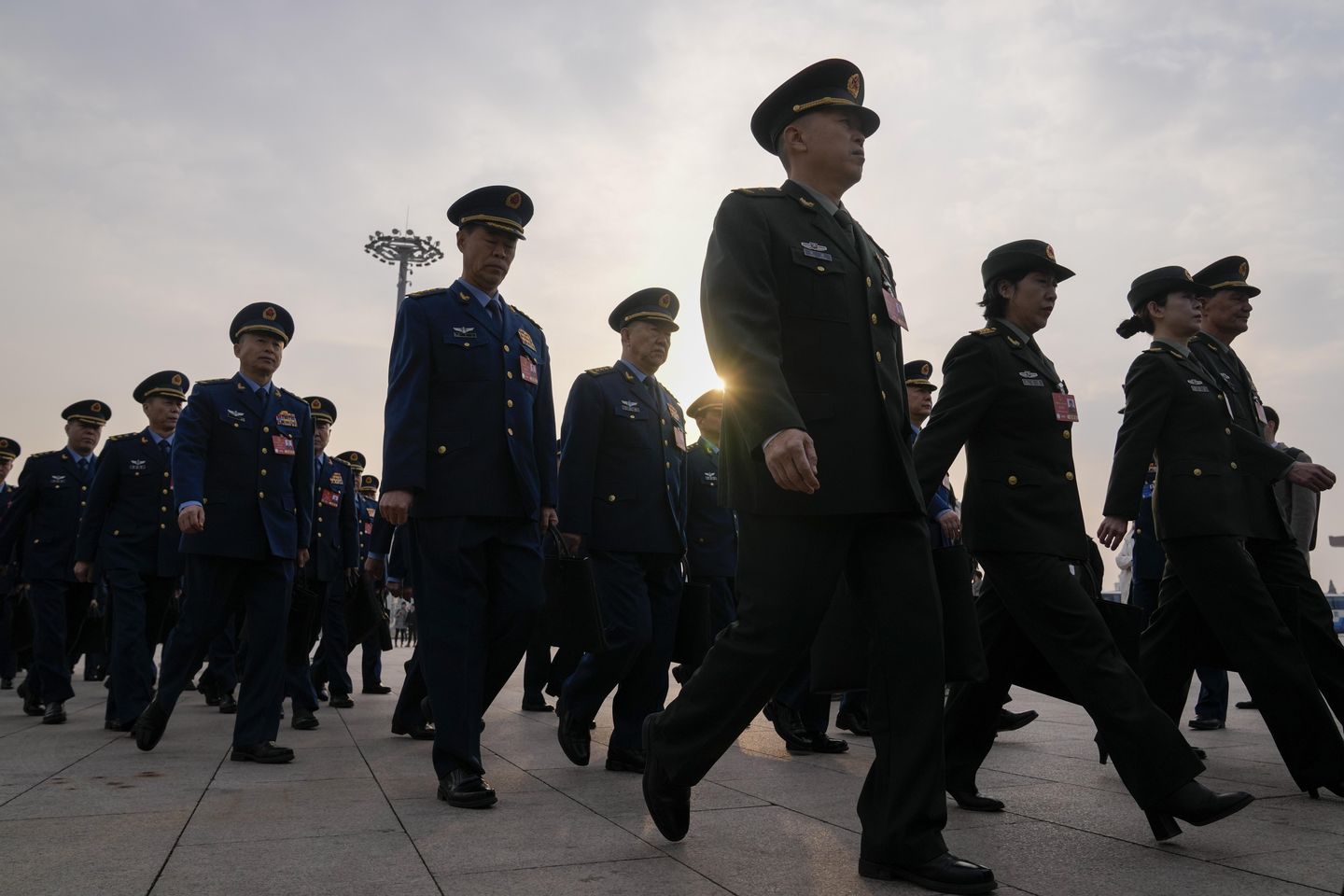
The danger of war with China over Taiwan is increasing and the U.S. needs to be better prepared for the conflict, retired senior military officers and a former high-ranking diplomat told Congress.
Retired Army Gen. Charles Flynn, until last year the commander of U.S. Army Pacific forces, said the zero hour is fast approaching.
“The threat of a Chinese invasion of Taiwan is no longer distant or theoretical,” he said. “The urgency to restore credible deterrence in the Indo-Pacific has never been greater.”
Retired Rear Adm. Mark Montgomery testified that a conflict across the Taiwan Strait would draw devastating Chinese cyberattacks on critical U.S. infrastructure, along with economic and information warfare.
The former officers were joined by former Deputy Secretary of State Kurt Campbell, the Biden administration’s point man on China policy, who also warned that greater military and diplomatic steps are needed to prevent a conflict.
The warnings came during a hearing Thursday of the House Select Committee on the Chinese Communist Party. The committee sought to determine what the U.S. needs to do better to deter a war, or fight and win if conflict breaks out.
Rep John Moolenaar, the Michigan Republican who chairs the committee, said China’s timeline of 2027 to be ready for a forced annexation of Taiwan was identified in 2021 by then-Indo-Pacific Command commander Adm. Philip Davidson and is known “2027 Davidson window.”
“This hearing today is not just another discussion about long-term competition with China,” Mr. Moolenaar said. “This is about a very real near-term threat in the narrowing window we have to prevent a catastrophic conflict in the Indo-Pacific.”
The warnings were bipartisan. Rep. Raja Krishnamoorthi of Illinois, the top Democrat on the committee, said there is a growing CCP threat to Taiwan and Americans need to be better educated about the need to protect the island.
“A CCP attack on Taiwan would be unacceptable for our prosperity, our security and our values,” he said. “Chairman Xi knows that America, on a bipartisan basis, stands for peace across the Taiwan Strait. However, we will not tolerate actions that put peace at risk.”
Gen. Flynn said protecting Taiwan, a vibrant democracy and regional economic powerhouse, is key to preserving regional stability and U.S. allies there.
The People’s Liberation Army has emerged from a massive, decades-long arms buildup as a “decisive force,” he said.
A major element of deterrence is demonstrating the power to prevent the PLA from landing, maneuvering, holding ground and subjugating the people of Taiwan, he said.
“There is no substitute for hard power being forward,” Gen. Flynn said, noting the recent deployment of the Typhon medium-range missile system to the Philippines that received the attention of Chinese President Xi Jinping.
“That’s a good answer, and I think what we’re trying to do is sow doubt and feed paranoia there because they did not calculate for those systems being brought in there,” he said.
Additionally, America’s defense industrial base must be strengthened to be able to sustain and win a conflict, he said.
Adm. Montgomery said the United States’ ability to defeat a Chinese attack on Taiwan is eroding, and PLA readiness was bolstered by 30 years of investment in advanced weapons, specifically designed to target U.S. military vulnerabilities.
“In the face of this threat, America’s ability to deter China is withering, and thus the risk of a conflict is growing,” Adm. Montgomery said.
In addition to preparing for cross-strait combat, the United States needs to prepare for a more likely scenario: A comprehensive cyber-backed program of economic warfare designed to force Taiwan to give in to mainland annexation.
“I think Beijing will want to force Taiwan’s capitulation through less drastic methods, like a comprehensive pressure campaign that targets the financial, energy and telecommunication sectors,” Adm. Montgomery said.
Mr. Campbell said congressional legislation, specifically the 1979 Taiwan Relations Act, has been valuable to peace and stability across the Taiwan Strait.
However, more needs to be done to strengthen regional alliances and bolster military power — both keys to preventing war, he said.
Taiwan has maintained a strong democracy that Mr. Campbell said is more resilient than the U.S. system, something that is a remarkable achievement.
Regional support for Taiwan in its confrontation with China has also increased sharply, Mr. Campbell said.
“The fact that we’ve gone from one or two countries talking about the importance to Taiwan to absolutely dozens now is an enormous achievement, not only of this body, but the United States, and that should continue,” he said.
Militarily, the U.S. strategic advantage in submarine power over China is “our jewel in the crown.”
Mr. Campbell, who helped form the Australia, U.S. and Britain submarine pact known as AUKUS, said the combined submarine power will be “a major deterrent.”
Adm. Montgomery said China also plans to carry out influence operations aimed at weakening public support in Taiwan and the U.S. for defensive actions and freezing leaders’ decision-making.
The retired admiral urged Taiwan to increase defense spending to 3% of gross domestic product this year and up that figure to 5% by 2028.
Gen. Flynn said he believes the U.S. military in the Indo-Pacific has overemphasized air and sea power. He urged strengthening Army forces in the region.
Missiles and other high-technology weaponry are being deployed there, but not fast enough, he said.
“We must establish a distributed, resilient land power posture across the first and second island chains, backed by rapid access agreements, robust joint exercises, and prepositioned equipment that accelerates our response times,” Gen. Flynn said.
The two island chains form a north-south arc from Japan to the South China Sea.
Adm. Montgomery also said delays in getting needed arms and defensive gear to Taiwan are “egregious” and arms sales must be sped up.
American forces should also preposition arms and munitions in Taiwan, similar to those in Israel and South Korea. Joint training and exercises with Taiwan should also be expanded, he said.
In the U.S., greater efforts are needed to strengthen the ability of the country to respond to are war in the western Pacific.
At the same time, China has prepositioned disruptive and destructive cyber capabilities inside critical infrastructure. Rail lines, airports and ports must be protected.
On China’s use of information warfare, Adm. Montgomery said he does not believe Beijing can overthrow the Taipei government through the use of such tools.
“But I do believe that information operations and deception run by the Chinese Communist Party will absolutely weaken Taiwan’s societal resilience when you combine it with the other tools, cyberattacks, economic pressures, energy pressures, cutting off communications with magical anchor drops on cables,” he said.
“When you combine that all together, it’s that cohesive, comprehensive attack that breaks societal resilience.”
Mr. Moolenaar said Congress must help the military and other branches of government to close critical gaps in weapons stockpiles, forward military posture, contested logistics supplies, cyber defenses and Taiwan’s readiness for war.
“Every decision we make on defense spending, arms deliveries, posture planning, must be driven by that urgency, because deterrence delayed is deterrence denied,” he said.




![‘It’s a Recipe for a Hundred Years of National Dominance’: Stephen Miller [WATCH]](https://www.right2024.com/wp-content/uploads/2025/05/Stephen-Miller-Completely-Obliterates-CNN-Host-Over-Her-Illegal-Immigration-350x250.jpg)
![Trump Posts Hilarious Pope Meme, Leftists Immediately Melt Down [WATCH]](https://www.right2024.com/wp-content/uploads/2025/05/Trump-Posts-Hilarious-Pope-Meme-Leftists-Immediately-Melt-Down-WATCH-350x250.jpg)

![Wild Road Rage Brawl Erupts in Milwaukee [WATCH]](https://www.right2024.com/wp-content/uploads/2025/05/Road-Rage-Turns-Violent-in-Oregon-Minivan-Mows-Down-Motorcyclist-350x250.jpg)


![Karoline Leavitt Calls for Jill Biden to Answer for Joe's Cognitive Decline Cover-Up [WATCH]](https://www.right2024.com/wp-content/uploads/2025/05/Karoline-Leavitt-Calls-for-Jill-Biden-to-Answer-for-Joes-350x250.jpg)
![Bessent Exposes Media Lies About April’s Stock Market Performance [WATCH]](https://www.right2024.com/wp-content/uploads/2025/04/Bessent-Exposes-Media-Lies-About-Aprils-Stock-Market-Performance-WATCH-350x250.jpg)





